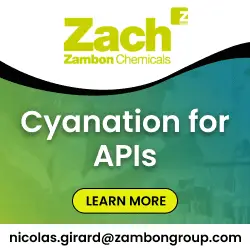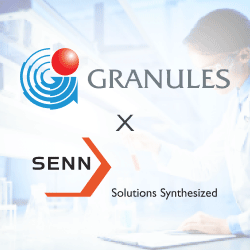Overview of cyanation for API & intermediates, organometallic catalysis, cyanation reagents & flow chemistry offered by contract service providers.
Q1. What is cyanation and how does it occur for APIs & intermediates?
Cyanation for APIs and Intermediates:
Cyanation is the formation of a covalent bond between a substrate and a cyano group. Cyanation is the attachment or substitution of a cyanide group on various substrates. A direct cyanation of benzylic alcohols results in the practical & scalable synthesis of corresponding nitriles in a short reaction time with good yields for APIs and pharmaceutical intermediates. Such transformations are of high-value because they generate C-C bonds.
The implementation of practical and scalable synthesis via cyanation for APIs and intermediates, however, can be challenging because of the hazardous nature of the reagents employed and the tight control of reaction parameters, including cryogenic temperatures, that help to afford acceptable selectivity and conversion for the desired reaction.
Cyanation is involved in API synthesis as well as custom synthesis manufacturing of advanced pharmaceutical intermediates and fine chemicals by the application of continuous flow chemistry, which offers a means to mitigate the risk associated with handling large amounts of hazardous reagents and enables better control of reaction parameters.
Aromatic cyanation reactions are one of the most fundamental organic transformation reactions. Of the various methods used to date, nucleophilic aromatic cyanation of aryl halides or aryl diazonium salts with copper cyanide has been most widely applied.
Q2. What are the different cyanation reagents?
Cyanation is a reaction in which a cyano group is attached or substituted on various substrates. The cyano group is a strong electron-withdrawing group and many cyanides are widely used in organic synthesis. In addition, due to their unique properties, cyanides have important application value in the fields of perfumery, functional materials and pharmaceutical industry. Some common cyanation reagents are listed below:
Cyanogen Bromide - (CN)Br or BrCN
Cyanogen bromide is a colorless to white crystalline solid with a penetrating odor. It is slightly soluble in water. Cyanogen Bromide is an inorganic compound used as a reagent in advanced organic synthesis for cyanation reactions.
Sodium Cyanide - NaCN
Sodium cyanide is a cyanide salt containing equal numbers of sodium cations and cyanide anions. Sodium cyanide appears as a white crystalline solid, lump solid or powder. Sodium cyanide is used commercially for fumigation, electroplating, extracting gold and silver from ores, and chemical manufacturing.
Potassium Cyanide - KCN
It is a crystalline salt which has no colour and is highly toxic and soluble in water. Potassium cyanide is often used within advanced organic synthesis for the preparation of nitriles and carboxylic acids and it is used as a reagent in analytical chemistry. Potassium cyanide is also used to extract gold and silver from ores.
Copper(I) Cyanide - CuCN
It is green in appearance and its uses include: (1) Polymerization catalyst, (2) electroplating copper or iron, (3) insecticide, (4) fungicide, and (5) antifouling agent in marine paints.
Q3. What are the recent developments in the synthesis of active pharmaceutical ingredients using flow chemistry?
Flow chemistry has been used for decades in the chemical industry, however, the pharmaceutical and fine chemical industries are increasingly adopting this technology. Recently, application of flow technologies for the preparation of fine chemicals, natural products, Active Pharmaceutical Ingredients (APIs), HPAPIs and small molecules has become very popular.
Flow Chemistry Enables:
- Production of pharmaceutical intermediates & API synthesis
- Smooth, practical and scalable synthesis
- Advanced organic synthesis of HPAPIs & small molecules
- Custom synthesis manufacturing of fine chemicals & pharmaceutical intermediates
Flow chemistry can be combined with other enabling techniques such as microwave irradiation, supported reagent or catalyst, photochemistry, electrochemistry, etc. for API synthesis . These combinations enable fully automated processes with increased efficiencies.
Flow chemistry provides other advantages such as faster and safer reactions, cleaner products and easy scale-up for fine chemicals, APIs, HPAPIs and small molecules. The inherent increased safety, improved product quality, cost efficiency, and overall production flexibility are drivers for the growing use of continuous flow chemistry.
Benefits of flow chemistry:
- Improved reaction time & mixing
- Improved temperature control
- Multistep practical and scalable synthesis
- Improved selectivity
- Better control and reproducibility of reactions
- Wider range of accessible reaction variables
- Rapid analysis, optimization, and scale-up of chemical reactions.
- Improved safety (managing hazardous reagents and pharmaceutical intermediates)
- In-line downstream processing
- Automation
Although the pharma industry still relies on multipurpose batch or semibatch reactors, it is evident that interest is arising toward continuous flow manufacturing facilities for organic molecules, including highly functionalized and chiral compounds.
Flow chemistry, sometimes referred to as continuous flow chemistry, is the process of performing chemical reactions in a tube or pipe. Reactive components are pumped together at a mixing junction and flowed down a temperature-controlled pipe or tube.
Flow chemistry equipment generally consists of pumps that transport reactants, reagents, and a solvent into reaction loops that introduce small volumes of reagents. These feed into a mixing junction where reagent streams are combined and passed into a coil reactor to provide reaction residence time.
The applied flow reactor can either be a fixed bed type reactor, where the reaction mixture is passed through a solid catalyst or reagent, or a tubular type reactor where the starting materials, reagents or catalysts are homogeneously dissolved in solution and pumped through a heated or cooled zone.
Type of Flow Reactors:
- Plug flow reactors
- Column reactors
- Gas reactors
- Reactors for slurries
- Photochemical flow reactors
- Trickle bed reactors
Q4. Who are the different service providers offering cyanation services?
Service providers offering cyanation services include:
Zach System
Zach provides custom API synthesis (API manufacturing) & custom synthesis manufacturing of quality intermediates involving asymmetric synthesis, cyanation of alkali metal cyanides & substitutes, metal hydride reduction services, amino acids derivatization, etc.
PMC Isochem
Over 40 years PMC Isochem has developed their manufacturing facilities with a versatile technology platform offering cyanation for APIs and intermediates, catalysis including biocatalysis and enzymatic catalysis, alkylation, hydrogenation, organometallic chemistry, halogenation and phosgenation for intermediate and API manufacturing.
Minakem
Minakem is capable of undertaking a broad range of multi-steps organic syntheses in their API manufacturing facilities. Their key technologies for small molecules and API manufacturing include cyanidation, hydrogenation, high pressure reactions, chiral chemistry, hazardous chemistry & continuous flow chemistry.
Anthem Biosciences
Anthem Biosciences is a Contract Research Organization (CRO) which has the expertise to carry out cyanation reactions involving Cyanogen Bromide, Sodium & Potassium Cyanide up to 100 Kg scale.
Corden Pharma
CordenPharma has experience in small molecule development & API manufacturing, with a list of chemical reactions including hydrogenation, amination, carbonylation, acylation, aromatic cyanation for APIs and intermediates, etc.
Innovassynth Technologies
Innovassynth deals in nucleoside & non-nucleoside chemistry with expertise in scale up from research to pilot & commercial API manufacturing, aided by cyanation (NaCN, KCN, CuCN) and metal hydride reduction services.
All Suppliers












 Zach System is committed to providing Highly Customized Solutions for all your Development Programs.
Zach System is committed to providing Highly Customized Solutions for all your Development Programs.










